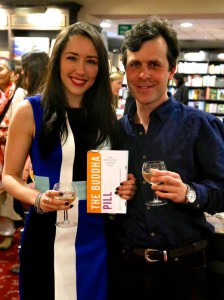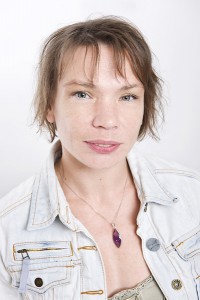Reading 'The Buddha Pill' written by Miguel Farias and Catherine Wikholm gave me some insights into meditation I want to share with you. The book was so good that I decided to mail to Catherine and invited her for a Mindfunda interview about 'The Buddha Pill'. The audio is sometimes a bit tardily because my provider was hacked at the time of the recording.
Can you change or are you born a certain way?
When I was educated as a psychologist I had to think about this ‘nature – nurture debate‘.
The nature side of this debate says we are born with a fixed set of genes. William Bernet has researched so-called ‘criminal genes‘. Being born with those genes, even though you are brought up in a loving environment will unleash the criminal in you. But don’t you like to assume that a good family, love laughter and acceptance can make even bad criminal genes flourish into happiness? Maybe so…
On the nurture side there is a compelling story in ‘The Buddha Pill’ about Nick.
A born criminal, a drug dealer. Being in prison just taught him how to be a more effective criminal. It gave him new connections, new methods. But one time he made a decision to stop. He focussed his energy on meditation and yoga and he has become a succesful meditation teacher.
Is meditation the Buddha pill?

Catherine Wikholm and Miguel Farias
I remember when I was young a lot of people, including my parents were engaged in transcendental meditation. Pictures of serene people floating above the air… Catherine Wikholm also saw these pictures in her childhood. And came to the same conclusion: there most be something magical about meditation that makes you a better person. When she was asked by Miguel Farias to research the effect of meditation on prisoners she did not hesitate one second.

Can meditation change you?
The book originated from a meeting with Sandy Chubb of the Phoenix trust. She uses meditation to improve the inner sense of well-being of prisoners. Being two experienced meditators with a scientific background, Miguel Farias and Ctaherina Wikholm decided that they would do a scientific experiment to see if meditation is indeed the Buddha pill.
Researching the scientific literature, Catherine and Miguel found out that there is not a lot of solid scientific research available into the merits of meditation and mindfulness. Nowadays, mindfulness has gained acceptance as THE panacea for inner peace for restless people (and aren’t we all restless?). But there is not a lot of research done about meditation that could meet the scientific standards of having a control group and a clear defined variable that is manipulated to see the difference between the two groups.
The results of the experiment are in ‘The Buddha Pill’. But the writers have added some very useful sidenotes for meditation. First of all: sitting alone reciting a mantra does not make you a better person. Change needs to be incorporated in the body. Yoga does just that. It is no wonder that their experiment involved Yoga practices.
The second sidenote was picked up by the media. Catherine explaines in the interview that she did not always like that. She and Miguel really belief in meditation as a good thing. The dark side of meditation got a lot of attention from the media. But I think it is a very important chapter. Meditation and Mindfulness are not for everybody. That is important to know. However, this book is not an attack on meditation or mindfulness. The Buddha Pill wants to unite the two contradictions that still hunt society today: magic versus reason. Often these two are seen as incompatible
So, after you have seen the interview, what do you think? Can people change for the better?
Do you like this post? Don’t forget to share!
Visit my Youtube channel (Don’t forget to subscribe)
Twitter: @susannevandoorn
THIS CONTENT IS CREATED BY SUSANNE VAN DOORN, AUTHOR AND OWNER OF MINDFUNDA; MAKING THE FUNDAMENTALS OF PSYCHOLOGY, MYTHOLOGY AND SPIRITUALITY EASY TO USE IN YOUR PERSONAL LIFE!
What is Mindfunda about?
My name is Susanne van Doorn, I am a Dutch psychologist, blogger and author. I have been working with psychology, dreams and mythology ever since I finished my study in psychology at Tilburg University. I made this independant site to share insights, and recent scientific articles about the brain, dreams, and mythology for use in your personal life.
This posting is categorised as Spirifunda:
psychology for everyday with a spiritual layer of meaning, searching for the soul. Our brains are wired for believe in magic. In a world filled with rationality, you sometimes need a little magic, a little “I wonder why”. Synchronicity, the insights of Carl Jung, the mythology used by Freud, the archetypical layers in the Tarot, the wisdom of the I Tjing, Shamanism, the oldest religion of humanity, all that information gets published in the Spirifunda section of Mindfunda.
Read more about Mindfunda here, or visit our Courses Page.
Ready for more free Mindfunda content on ‘SPIRITUALITY‘?

The Body of Poetry: Sculpting Curves into Words

Woman Most Wild, 3 Keys to Liberating the Witch Within

International Woman’s Day: Be Bold for Change
Comments or suggestions? Share your thoughts:



